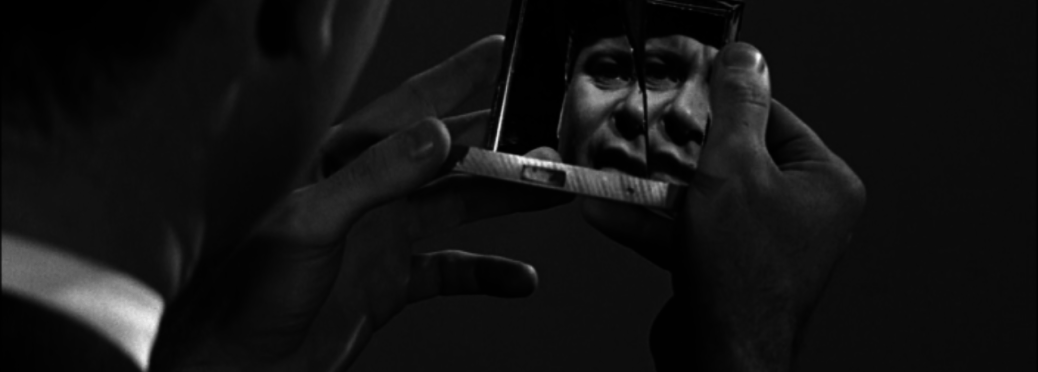At its beginning, Billy Wilder’s 1960 film The Apartment seems to have a cheerful sort of concept. C.C. Baxter (Jack Lemmon) has a life he enjoys, and for the moment his one complaint is that his own apartment is too often borrowed by others (stemming from a simple favor, Baxter now lets his work superiors borrow his apartment as a setting for their own romantic affairs). However, he’s pleased with his consequent promotions and is interested in one of the elevator girls, Fran Kubelik (Shirley MacLaine). However, this pleasantness is brief. Kubelik has been involved in a disastrous affair with Baxter’s boss, Sheldrake (Fred MacMurray), in that very apartment. This all comes to a head when Baxter comes home to find the nearly dead Kubelik has attempted suicide in his home
The opening of The Apartment mirrors the beginning scenes of King Vidor’s The Crowd (1928). The New York skyline bleeds into the vast expanse of a faceless skyscraper, there fading into what is perhaps the most iconic shot of The Crowd—desks and robotic workers that seem to reach on forever. But while this communicates trepidation in The Crowd, Baxter’s chipper voiceover introduces the scene with disquieting optimism. Along with Johnny and Mary in The Crowd, Mr. Baxter and Miss Kubelik are caught in a whirlpool of fraught desires and self-deception. Against all instinct, it is only when they face their own unhappiness that the possibility of true happiness opens up. Like the broken mirror that Kubelik carries, they are split—between their default lives and the cognitive dissonance of changing their fate.
Initially, Baxter and Kubelik are resigned to their place in the universe. Both Baxter and Kubelik are what Kubelik calls “happy idiots.” The phrase comes up when Sheldrake complains that Kubelik isn’t being as fun as she normally is (though of course this is because he’s mistreating her). Kubelik rattles on with an attitude of “this is how it is”—she hardly blames Sheldrake for her misery, because “some people take and some people get took.” She says this with a passive shrug. Baxter sits and waits in the rain while other men use his apartment for their conquests, convincing himself that he’ll be fine as long as he gets his promotion. The two are happy as long as they play stupid. They are split into dual realities—the one that makes them mechanical cogs for “happiness”—traditional success—and the one that faces the reality of their depression.
Baxter, quite literally, must face his own dissatisfactions with life when he finds Kubelik after her suicide attempt. Suddenly he is faced with both his shame over letting the others borrow his apartment, as well as his failed attempts to court Kubelik. It is only at this point that he truly has a chance at winning Kubelik’s love. Similarly, it takes Kubelik’s near death experience for her to move past Sheldrake and pursue a relationship with the kind and genuine Baxter. This cognitive dissonance—the fact that sadness is essential to their happiness—is reflected in the film’s visuals. When Baxter first finds the unconscious Kubelik, it appears she is sleeping. Shadows shroud her face and she looks inimitably peaceful, a deception that everything is okay. When Kubelik’s brother-in-law confronts Baxter, Baxter almost fights back. For a moment he waves his finger at the other man, the harsh noir lighting making him appear threatening for a split second. It doesn’t last—he loses his confidence, steps into the light, and says “Want a martini?” When Kubelik is dying in Baxter’s bedroom, the scene is invaded by the girl he drunkenly brought home and the inane music from the record player. Most pervasively, Kubelik carries with her a broken mirror, which because of its crack, produces a doubled image; she likes it because it shows her how she feels.
In one poignant moment, Baxter reveals that he too has attempted suicide. His whole anecdote is told in his usual cheerful tone, but like the broken mirror, the story reveals that there are more sides to him than one would initially suspect. In the end, both he and Miss Kubelik have to face their broken reality in order to see the possibility of happiness. The Apartment, depicting tragedy as a comedy, leaves us to sit in that uncomfortable broken place. Even when things have “resolved” the couple is hesitant in their honesty—their reunion isn’t one of cinematic lovers. Baxter clumsily tells Kubelik he adores her. She tells him to “shut up and deal.”
by Merritt Mecham



